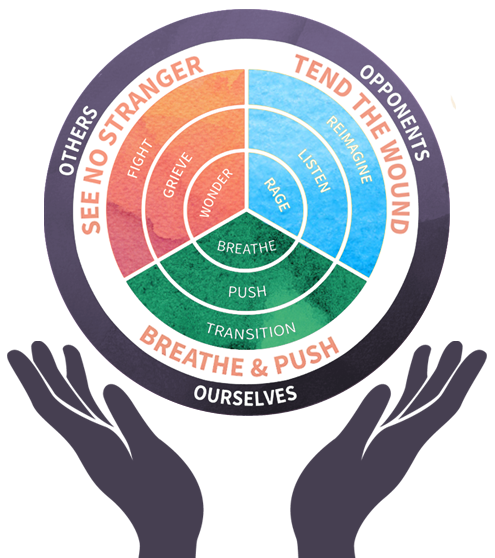7: Breathe

“Breathing creates space in our lives to think and see differently, enliven our imagination, awaken to pleasure, move toward freedom, and let joy in. For those of us who live in bodies that are denigrated by society, breathing like this is a political act.”
“This is what I want to tell you: You don’t have to make yourself suffer in order to serve. You don’t have to grind your bones into the ground. You don’t have to cut your life up into pieces and give yourself away until there is nothing left. You belong to a community and a broader movement. Your life has value. We need you alive. We need you to last. You will not last if you are not breathing.”
—Valarie Kaur, See No Stranger, Chapter 7
Understanding Breathe
A Practice of Love for Ourselves
Breathing is the practice of taking conscious deep breaths. It is also the act of creating space in our lives to slow down and care for our bodies, minds, and spirits. Breathing in community is how we sustain ourselves and our labors for justice — and let joy in.
Choosing to love ourselves, by breathing deeply each day, is a political intervention. Taking the time to breathe—literally and metaphorically—is a way to assert that our bodies are worthy and beloved. Loving our bodies is the first and primal act of loving ourselves. This is how breathing becomes an act of revolutionary love.
- Place your hand on your heart and another on your belly. And now let the breath come, feeling your belly fill up. Hold for four. Let it go. What does it feel like to let this deep of a breath into your body?
- Take in your surroundings. Let your eyes fall on the most beautiful thing around you. Notice its color and shape. Notice the way the light falls on it. Notice its beauty. No matter what is happening out there in the world right now, no matter how dark, or violent, or cruel, this beautiful thing also exists. The world right here is just as real as the world out there.
- Take another deep breath. Notice if it’s a little easier. When we give our attention to wonder, we call it breathtaking. But perhaps we should call it breathgiving. Awe stretches out our capacity to be present and let in even a sense of joy. Notice what you feel in your body.
- Is this feeling in your body familiar or is it rare? How have you been breathing? What do you need to be able to breathe like this every day? Get quiet and listen.
- What activities invite this breath in? They may be singing, chanting, dancing, drumming, bathing, burning, walking, writing, eating, sleeping, retreating, being in nature. Notice what practices your body wants. What are you longing for? What gives you pleasure? What would it mean to weave just a little bit of this into every day?
- How is the practice of breathing an act of revolutionary love for ourselves?
- How can collective breathing be a revolutionary act?
- How can the practices of breathing help us to wonder, grieve, fight, rage, listen, and reimagine?
- Make “Breathe and Push” a daily mantra. Write down the words “Breathe and Push” on a post-it on your desk or where you work. Every day, before every small push, ask yourself: “How am I breathing?” Imagine taking small deep breaths before every meeting or task.
- Begin your morning with a practice that puts breath in your body. Imagine movement or meditation or mantra. For example, Valarie Kaur wakes up with the words, “I get to be alive. I get to be alive today. I get to be alive today with you.”
- Pay attention to the literal act of breathing. When we pay attention to our breath, our minds are called to the present moment. Not the past, not the future. Here and now. Inhale and exhale. Even in the pain of labor, even when we cannot control anything else, we can consciously take one breath, and then another.
- Explore ancestral practices that might guide us in breathing collectively: How did our ancestors breathe together? What were their practices and rituals? If these practices are not from your own cultures, learn to engage with these traditions in a culturally responsible and respectful way.
- Reflect in your wisdom journal: What do I need to breathe? What is the one practice I can bring into my life now? What can I do every day (every week, every month) to practice breathing? How can I do these practices in community with others?
- Resist the practice of “spiritual bypassing”—the belief that we are changing the world by investing in our own spiritual wellness, even as we continue to participate in the same systems that cause harm to others. Ask yourself: In what ways does my wellness come at the expense of others? How can I support and fight for vulnerable groups so that we can all breathe, rest, and thrive?
- Practice noticing one beautiful thing wherever you are, and to remind yourself that beauty continues to exist alongside injustice. Practice sharing that beauty with others.

